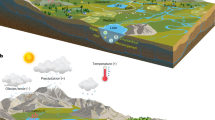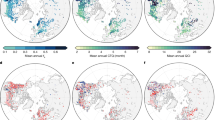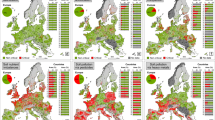Abstract
IT has recently been argued1 that the afforestation of catchment areas in Great Britain seriously reduces water yield, and because of this the planting of such areas should cease until it can be proved that the nation's water supplies are not being threatened. In both this paper1 and a contemporary review2 the effect has been interpreted primarily as that of afforestation upon transpiration.
This is a preview of subscription content, access via your institution
Access options
Subscribe to this journal
Receive 51 print issues and online access
$199.00 per year
only $3.90 per issue
Buy this article
- Purchase on Springer Link
- Instant access to full article PDF
Prices may be subject to local taxes which are calculated during checkout
Similar content being viewed by others
References
Law, F., Advanc. of Sci. (in the press)
Laurie, M. V., Int. Union of Forest Research Organizations, 56/11/16. (Oxford, 1956).
Rennie, P. J., “Some Physico-chemical Properties of Moorland Soils as related to Afforestation”, unpublished thesis, Imperial Forestry Institute (Oxford, 1956).
Rennie, P. J., Soil Sci. (in the press).
Ministry of Agriculture and Fisheries, Tech. Bull., No. 4 (1954).
Author information
Authors and Affiliations
Rights and permissions
About this article
Cite this article
RENNIE, P. Effect of the Afforestation of Catchment Areas upon Water Yield. Nature 180, 663–664 (1957). https://doi.org/10.1038/180663a0
Issue Date:
DOI: https://doi.org/10.1038/180663a0
Comments
By submitting a comment you agree to abide by our Terms and Community Guidelines. If you find something abusive or that does not comply with our terms or guidelines please flag it as inappropriate.



